
Sunday morning services at Level Ground Church
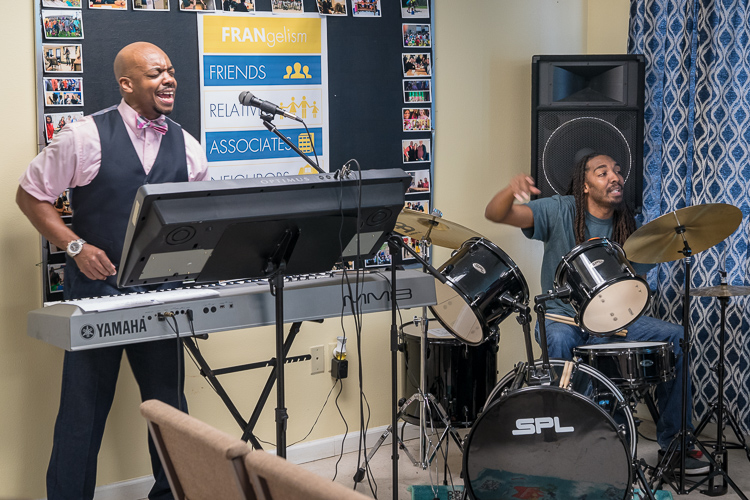
Pastor Daylon Taylor and Youth Pastor Xavier Raymond leading services.

Kevin Brown, whose father established a church in Hollygrove in the 1960s.
Kevin grew up in the neighborhood and has run a community center there.
He wrote a dissertation on homicide in the neighborhood.
Kevin: Originally Hollygrove was a mixture of working-class Italians and African-Americans, and during the years of white flight the Italians moved away. So, when the Italians moved away they continued to own their homes and now they rent those homes. And that's one of the stories of, kind of, American inner-cities. So now, we’re seeing a resurgence of young white families that are moving back into the neighborhood. It never was a completely black neighborhood, but it was primarily African-American, like 97%. Now we’re down to 92%, so there's been a dramatic change. Q: White people who are moving in, do you feel like it's more in the order of gentrification or more modest income white people? Kevin: No. I think it's more modest income white people. In fact, I'll show you the house I built, and I sold it for $130,000. It was a house probably worth $200,000. Probably would've been worth $250,000 in Lakeview, but I sold it for $130,000, and a young white family bought it because it was the only home they could afford. It was the best on they could afford, at $130,000. |
![]()
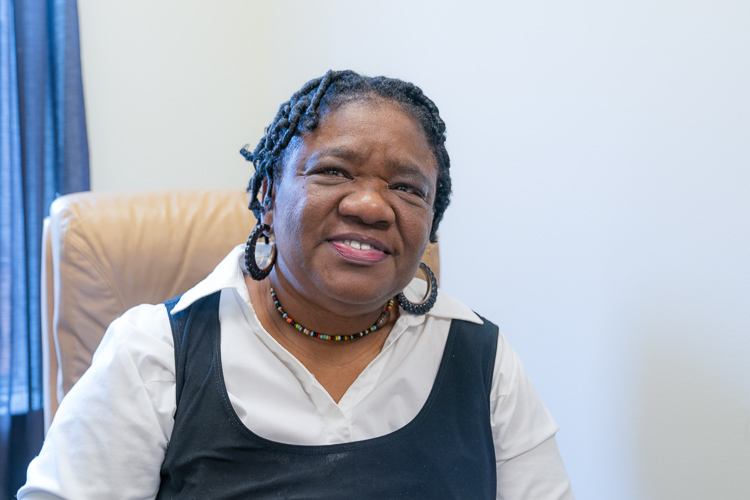
Evelyn Turner
Q: You also helped integrate the schools? That must be a story! Evelyn: Actually, my sister was—everybody has heard of Ruby Bridges. She was the little girl that got national attention for integrating the schools in New Orleans, but the very next year they selected another group of kids. My sister was one of them. She was five years old, I was 10, and each day I had to go to school to pick her up and face a throng of angry parents who yelled at us and called us names. At 10 years old and five years old. That was my experience. It left a lasting impression upon me and my sister. To that extent we were involved in integrating the school. The third year the schools all the white kids were gone. They left. And the schools had become completely black. Almost completely black. |
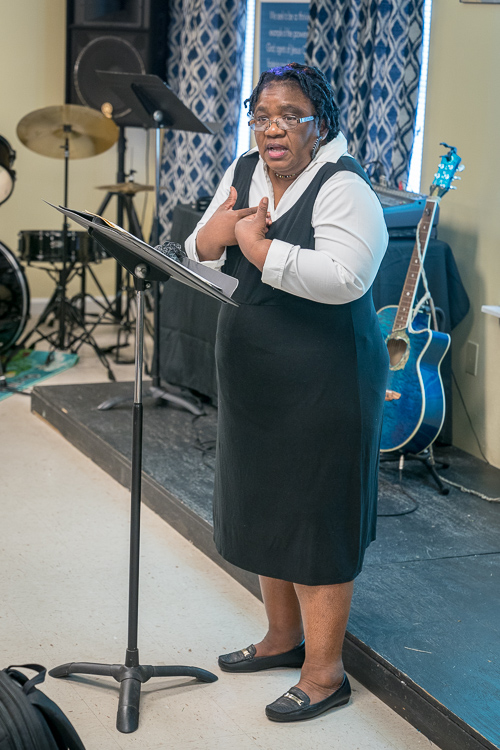

Evelyn: As far as this neighborhood is concerned, I moved into the neighborhood after Katrina. I'm originally from New Orleans, from the ninth Ward, but I was working with Trinity Christian Community and Kevin Brown in this neighborhood and had fallen in love with the neighborhood. So, after the storm—I lost my house in the ninth Ward—there was a house here that needed to be redone it was an opportunity and I took the opportunity to move into Hollygrove. The house I live in is across the street. I got a lot of help from the thousands of volunteers that came here. |
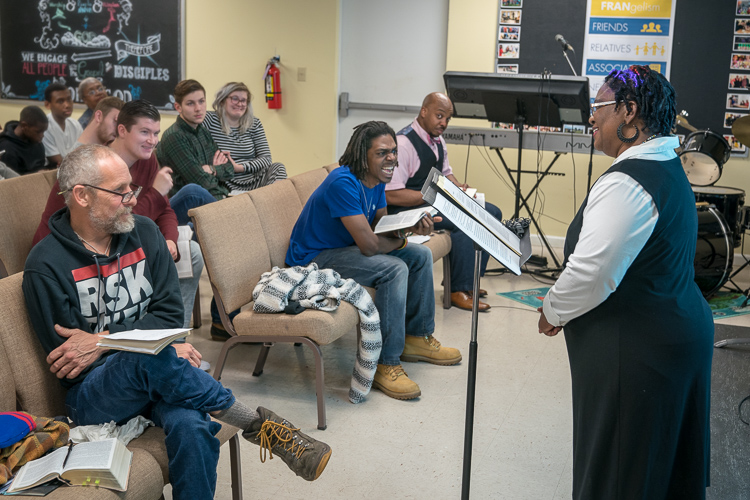
Evelyn: I live across the street, I have three kids, five grandkids, I'm retired. I have a heart for this neighborhood. There are ways the neighborhood is changed dramatically, and there are other ways and things that are sadly the same. The neighborhood—we have a large percentage of older people and many of those people own their home. 40% of the houses in Hollygrove were owned and so it was the motivation for a lot of people to come back because this was their home. They weren't renters. Because of that we had a lot of old stock houses that had not been repaired in generations being rebuilt. So physically the neighborhood looks better. |
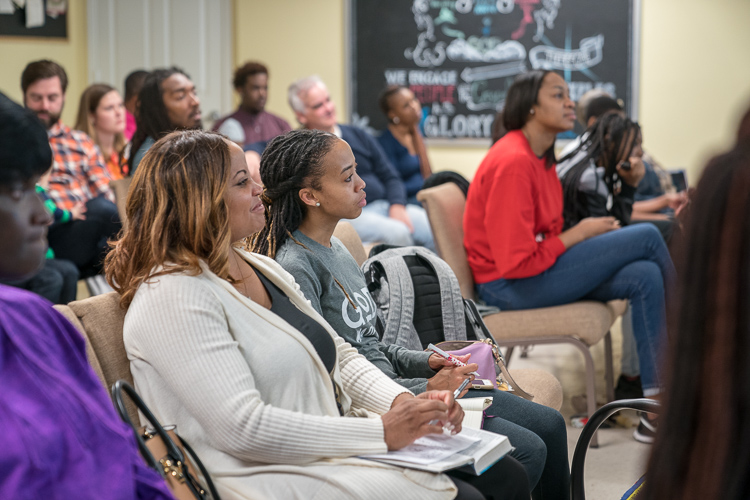
Evelyn: There are a lot of people who are better off that way, but there is still a large number of younger, particularly males, who are unemployed. There's less crime, but there's still an inordinate amount of crime. There's a lot less crime. And I think having a nicer place to live effects that, but these men need work, and a lot of them have dropped out of school, and a lot of them lacked education and so forth. There’s a lot of very involved intricate problems that still exist in our community. So, there's good and there's not so good. I have hope for the neighborhood. I've seen things change. I've seen things get better and I do believe they can get even better. |

Evelyn: We are trying to find a way to engage the community—to be that link. It's not easy. Hollygrove is like a closed community. And it’s closed because generation after generation people live in the neighborhood. You almost have to be born here to be part of the neighborhood. We can come in and join arms with the community, and especially with the young men. That's my hope. That's my prayer. |
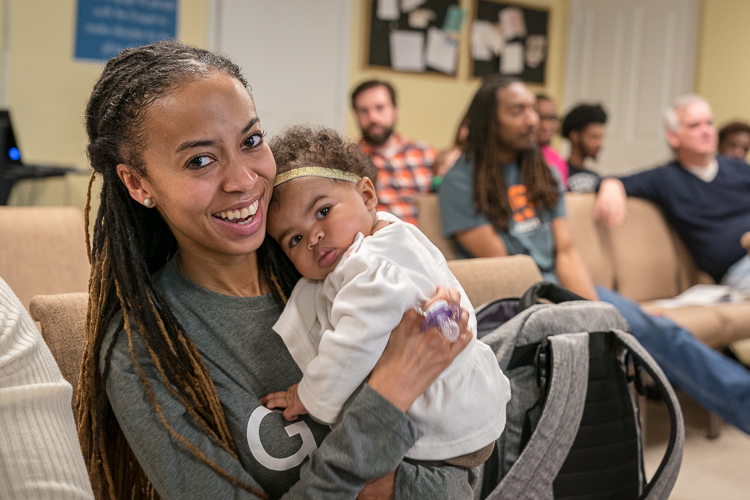
Evelyn: Our programs have gotten better. We have been able to tap into some resources that we hadn't been able to before. And we've been able to get some people with connections on the boards of the organizations. So, our kids are being exposed to on a larger scale and like the new program they have, they're going to be unveiling next week Tuesday, it's the robotics and engineering kind of activities. We didn’t have that kind of thing. We were just doing mentoring, just homework assistance. And now we can go a little further. A little further. We've seen quite a few of our kids go on to college. We've seen our kids excel. |
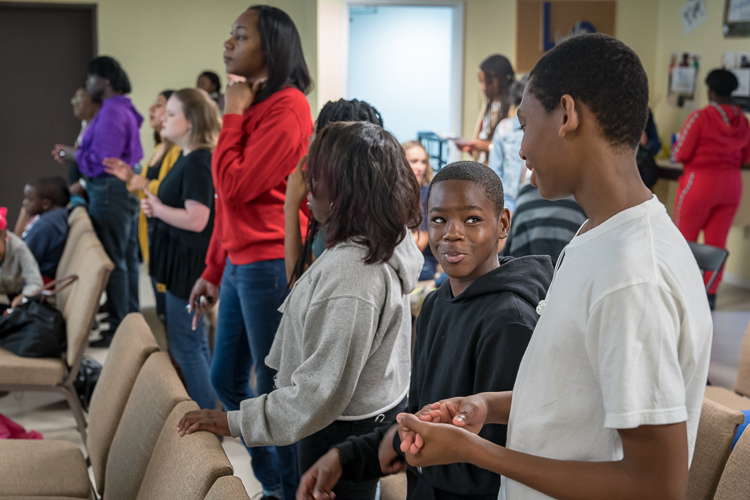
Evelyn: As I was talking about today—at TCC you can get a child, but we need to get a mom, and a dad, and a brother, and a sister, and a neighbor to help the whole family. If we were able to. Not just this one kid who does well and ends up going to college and excelling, but what about his—he leaves behind a mom who is struggling still, sisters and brothers. We want to see them thrive as well. |
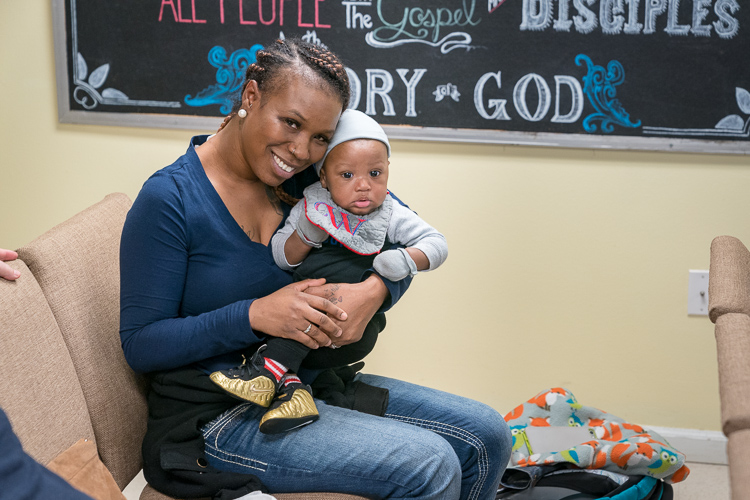
Q: Do you feel like you see a path to that through the kid? Evelyn: We’re seeing it more and more, for the first time. That one is always hard because parents, mothers in particularly, they want their kids to take advantage of all the opportunities. They wanted that for the kids, but they often were working two jobs, you know, they're tired, life was getting to them. But we're seeing mothers in particular, and fathers too, but mothers coming in and volunteering and taking part. That lady said that it was her first time back, that's one of our kid’s parents from TCC. She’s a member of the church now. That's what we want to see. And she's not just a member of the church. When she was out, people visited her, people bought things for her baby, and just showered her with love and said, “you know, you’re part of us.” She's part of this neighborhood. She's a member this neighborhood and so she's representative of what we want to see more of. Q: That's amazing work you guys are doing. Evelyn: That's God! |
![]()
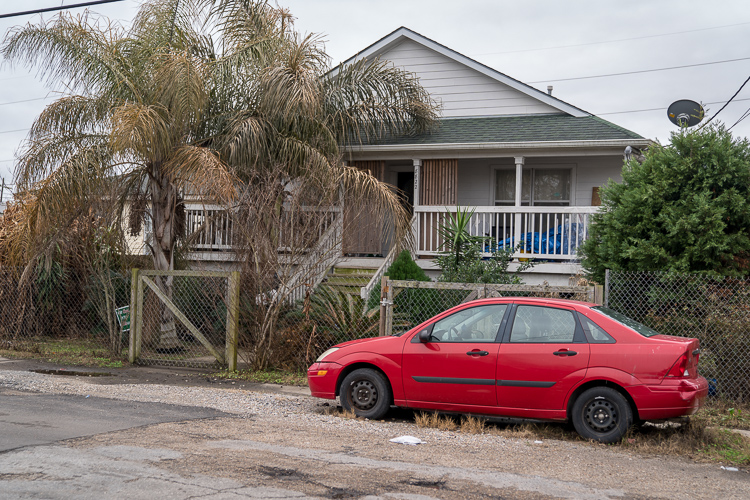
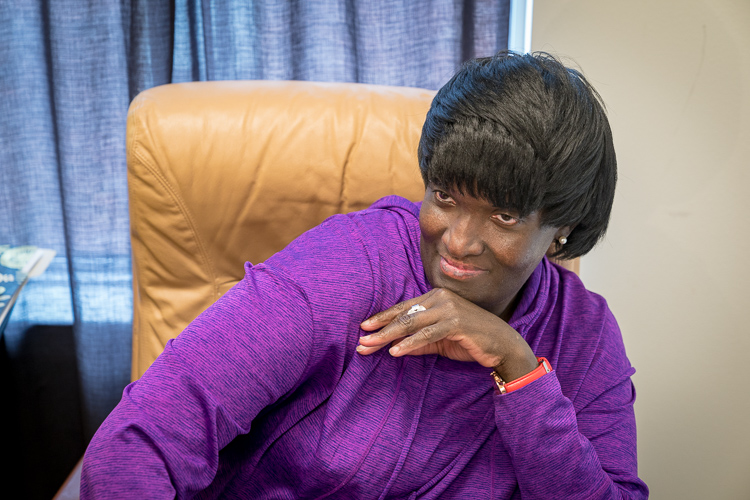
Trenida
Trenida: Let me introduce my little self. My name is Trenida. I stayed at Palmetto Apartments that's over there by TCC, the apartments on Cambronne. Okay, I’m about to start my little thing. We was in a house, and I had my two kids and my husband. It was at nighttime and we was asleep. I stepped down and I felt water, you know, it was like nothing and then I really felt it. The kids felt it too. So, I looked out the window, so it was like, the water was like high. And so, we arrived to the Superdome, oh my God! It had so many people there. |
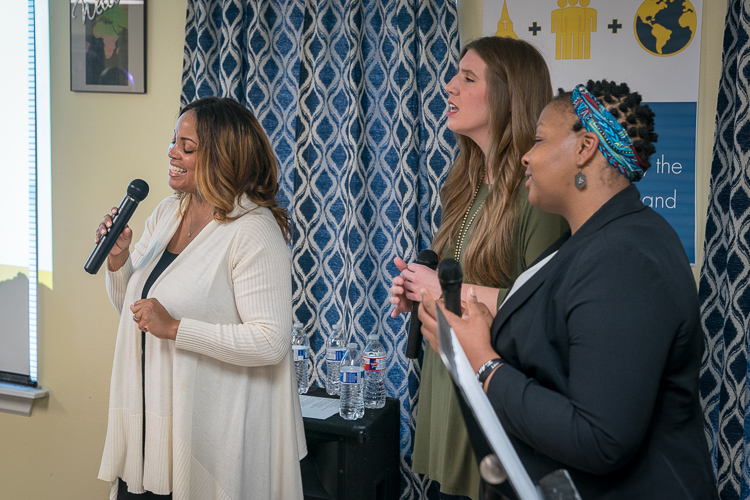
Trenida: So, they let us out of the Superdome. It was still, you know, it was just a lot of people. They had a lot of buses, but they were all was going to different places. Tell me—I just got to the nearest bus and they shuttled us to the Texas. We went to Fort Worth, Texas. We stayed in Texas for like a year and a half or something like that. I didn't stay long. The reason I didn't stay in Texas long was I was homesick. |
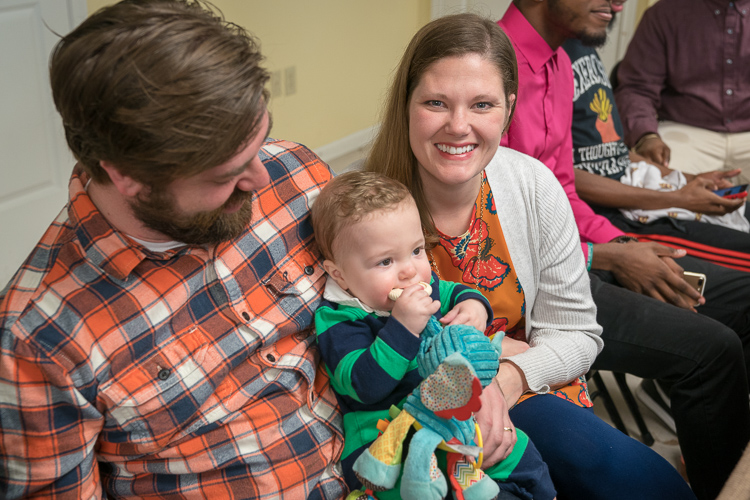
Trenida: I left from there and we went on to Baton Rouge and stayed there for little while because it was close to home, but not close enough for me. So, I went to Baton Rouge and my little girl had—she wanted to go to school down here at Ben Franklin. They had this bus called “The Swift,” and it was like a five-dollar ride. The reason we took advantage of it, I was able to get her back and forth to Ben Franklin. She would take the test to get into Ben Franklin, and so when she took the test, and the lady told her, “Oh, you failed by one point. Oh, you needed study this book.” And she came back and told me, she said, “Mama, why didn't they tell me?” And as soon as she went back, [snap] two points over the test. |

Trenida: We moved back into the apartments, but not the apartment we came out of. We moved back there now, so we had to move. I moved down Joliet [Street]. The reason why I like Hollygrove and I like TCC Level Ground is because they are some loving people and I wanted to stay around loving people that's going to, you know, if I ask a question I know I can go to either one of them. I just love this family because I can ask them—you know what I'm saying? |
![]()
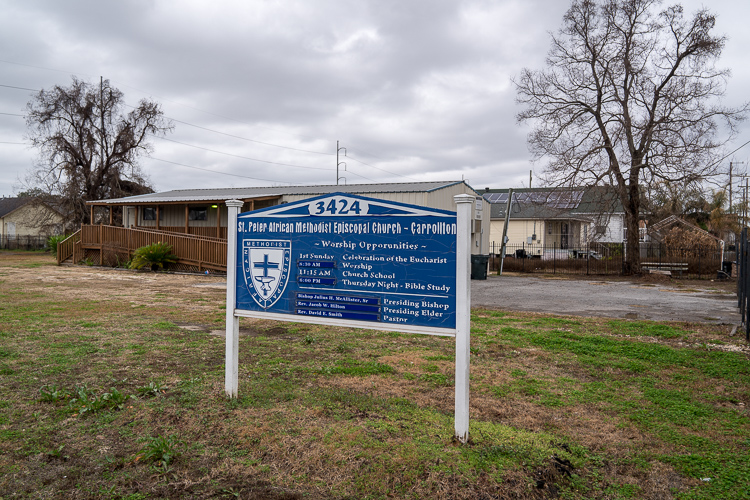
St. Peter's AME church was flooded in Hurricane Katrina and has been in a trailer since then.
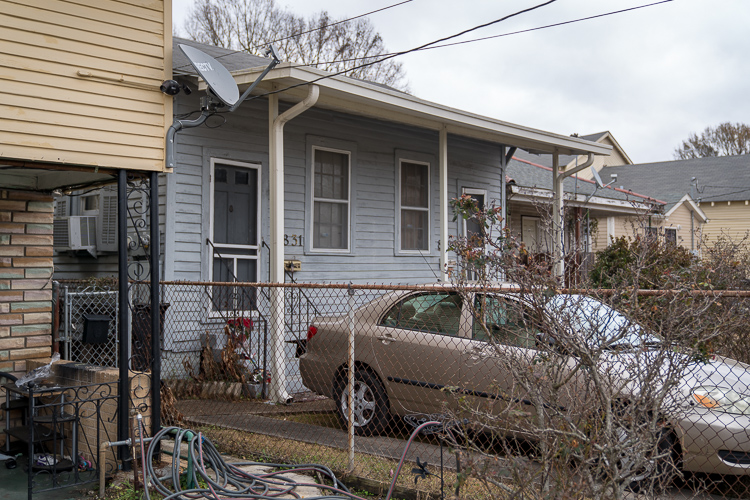
![]()
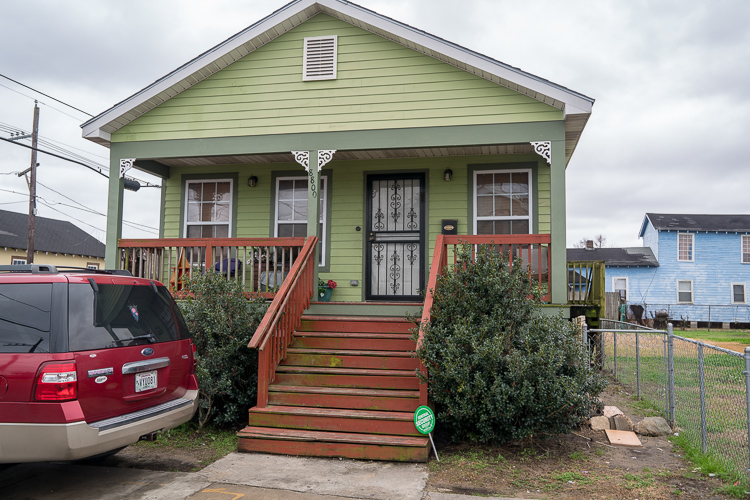
![]()
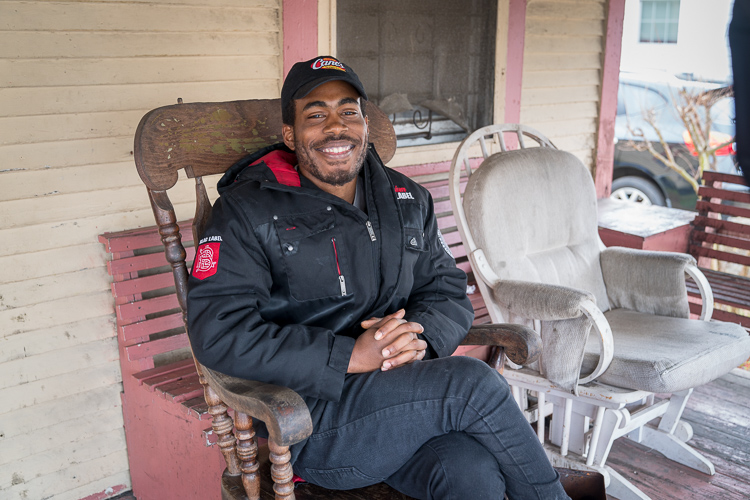
Phillip Wricks
Phillip: My family is one of the original families from this neighborhood over generations, but with Katrina, it dispersed a lot of people. Before Katrina most of the people in this neighborhood were from the 17th Ward, or this neighborhood is Hollygrove specifically. But since Katrina it's a mixed. You have people from the 9th Ward, which is downtown New Orleans. And a lot of different people—the city is more mixed up now. It's been filling up slowly. Before Katrina when you moved into a certain area of the city it was based on your family, like are they rooted? New Orleans is real big on that, like a lot of families is rooted in certain neighborhoods. For instance, my family is probably the biggest family from this neighborhood. If I go to another area of the city and somebody might ask me, “aye, you look like the Wricks,” or something like that, because that's my last name. They know my family is specifically from Hollygrove. But the thing since Katrina, a lot of the housing market is fluctuating so people is just looking where they can get good housing at, so the people that is originally from downtown, uptown. That's why the city is real mixed up now. |
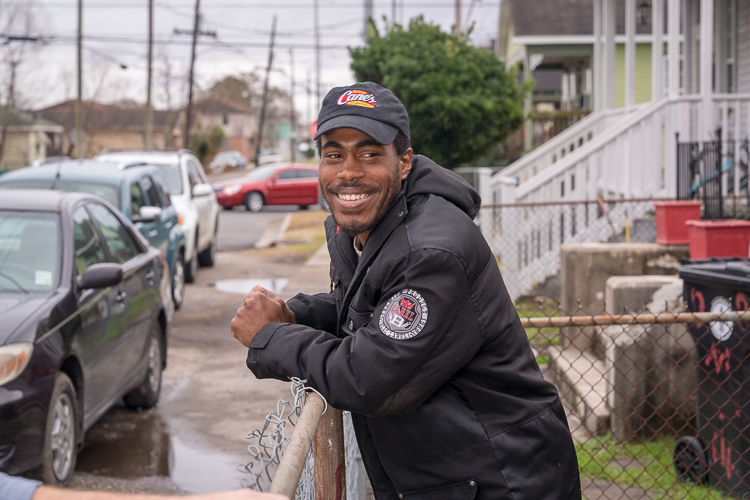
Phillip: There's always new tensions. If you talk about crime wise, there's always going to be tensions. When Katrina hit it displaced a lot of neighborhoods that might've gone against each other. Some of these people are moving around the corner from each other because that was the only available space after the storm. And still some places in the city still haven't, I mean you can look around this neighborhood and we still have a lot of vacant lots and houses that's not, and it's been like 12 years, it's moving, but it's like it's moving slowly, so that's why the city real mixed up. Because people are just trying to find where they can get good housing at nowadays. It's not even about where you're from or where you stayed before Katrina. So, you know a lot of the city has gangs. New Orleans is a little different, eclectic, like, different in that sense because we have neighborhoods and those neighborhoods get broken down into like sets, and those sets get broken down to individual blocks. So, this block might be beefing, getting into it, with that block. It might be literally like I don't know how many houses away from each other. The lines was defined, you know, Katrina wiped those lines out. So, everybody was like on top of each other, that's why the crime rate was real crazy after Katrina. So that plan like, it's a good plan, but it's like it needs something else other than just bringing kids—because they have schools, like New Orleans is so small people go to school across the city. I might go to a school across the city and stuff like that, and a lot of children grow up with each other. That doesn't particularly stop them from getting older and seeing each other and letting where they’re from prevail over their childhood relationship. You see what I’m saying? They might be like, “yeah, I knew you ten years ago, but I'm from the 5th Ward and you’re from the 6th Ward and historically we don't like each other, so.” It's more about—it's deep-seated. But to be honest with you, Katrina had that effect—it was like a double-edged sword—it mixed a lot of people, but it washed those lines away. So a lot of those children, they're not growing up with that sense of, “oh, you’re from the other side of the city,” because those lines, they been blurred since Katrina hit. Q: So, you feel like it's some of the tension has eased? Phillip: Yeah, you could say that. Nowadays it's just like—nowadays New Orleans is like you have crime going on. You have these tensions. It's not based off the things that used to fuel the fires of New Orleans, like different neighborhoods. Nowadays it's just like knuckleheads doing crazy things. Q: Like if there are tensions now it's not so much between neighborhoods? It's from one block to another? Phillip: Tension is always going to be between neighborhoods. I mean, we’re having tensions between countries right now, so. Tensions, they're going to always have them between a different part of a different—it's stupid. If you look at New Orleans, it gets broken down into different wards, the different wards get broken down into different neighborhoods, and different neighborhoods get broken down into different sets and stuff. You're going to always have those tensions. |
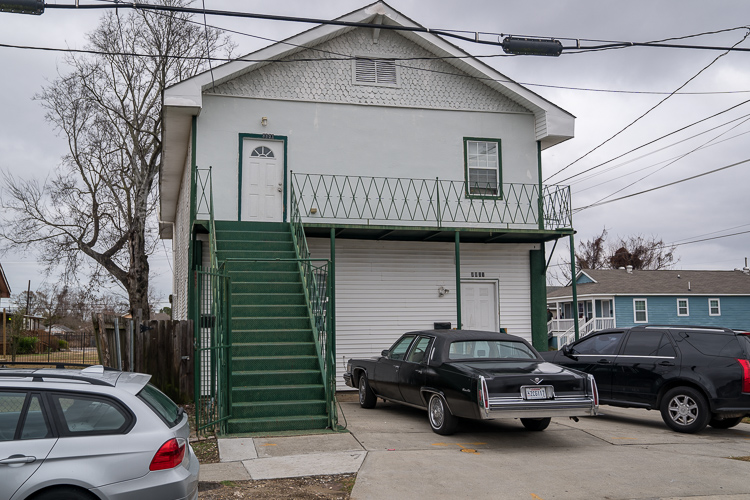
Phillip: They have jobs available. New Orleans, we have our food industry. It's crazy, so there's always restaurant jobs. They have jobs available. I mean we don't have an unemployment issue I would say. Economically, they're passing laws trying to get minimum wage raised and they have programs for people like ex-cons and felons. They're doing programs for people like that. So, the job market is pretty good, and temp services and stuff like that. If you're looking for a job nine times out of 10 you can get a job. In New Orleans the only thing that will mess you up with getting a job is if you're just not putting enough effort into getting one. |
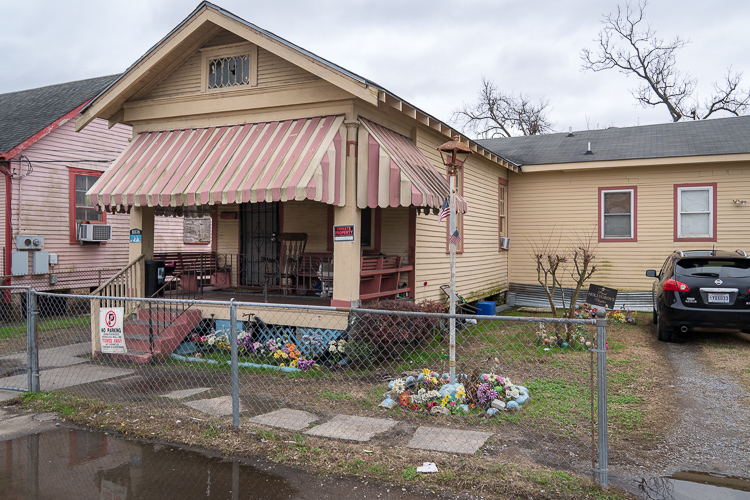
The Wricks house
Kevin Brown: So, one day when I was doing my dissertation I came to this corner. It was all blocked off and a young man had been shot. And he ended up right there laying down on the ground [points in front of the house we are at]. Phillip: Oh, you're talking about my cousin. Yeah, so one day we was out here. I don't know what really went down, if it was mistaken identity or whatever, but shots rang out and I come to find out my cousin ended up getting hit. We was all standing on the corner and he ended up traveling to a ways down and he collapsed in my grandmother's yard right here. And…. he ended up getting shot I don’t know—he got shot multiple times actually. I was actually talking to him on the corner. When the people pulled up and started shooting I had just walked off from talking to him. So, when I walked off that's when the shots rung out and we all scrambled and when I looked around he was already walking into the yard and collapsing. I had went through a little strange string of being at the wrong place at the wrong time. That's probably not something you would normally see every day, but by me being from this neighborhood, you know, being around certain people and some things like it's inevitable because of where I'm from. But for the most part I've avoided those types of situations all my life. That's not nothing that traumatizes me or nothing like that. It’s something that I've never really been a part of, I just happen to be in the general area. |
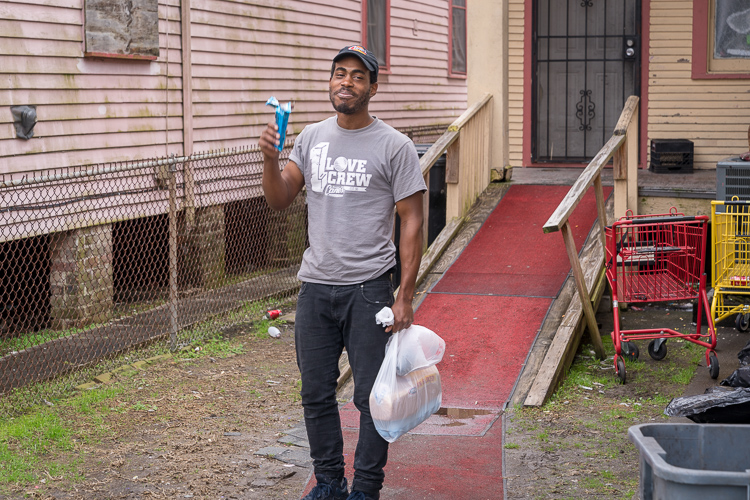
Q: How would you describe how you go about not getting to be a part of it? How do you go about avoiding it? There must be people that you know and like who are affected by it, but you can stay friends with them and still stay away from the difficulties? Phillip: I mean, when I was young when I was like four or five years old I met Mr. Kevin and up until now that's probably been the biggest influence on my life, probably with Kevin kept me away from the streets, kept me in the books, playing basketball, going to school and stuff. I got to see different at a real, real, real young age. I got to travel, go out of town, go to different places, go to camps, go to Christian camps for weeks at a time and stuff like that, so I was just exposed to a different lifestyle at a real young age. So, I always was smarter and more intelligent than the people around me, so once I got exposed to a different life, I was already able to piece together, “okay, this is what I was born around, this is what people go through, but this is not nothing I have to choose to go through.” Even though I've been through things in my life, but for the most part I have avoided those type of situations, because, you know, some people don't know different. People fall into different categories. You have people that they do wrong and they know different, and you have people that just truly honestly don't know different. They don't know—you know I'm saying? Some people they don't know anything else outside these 5, 6 block radius. So, I got exposed to a different lifestyle at a real young age. That's what kept me away from a lot of things. I feel like for the most part my life was surrounded by people who was into the things I was doing in my life. So, I was going to youth group, church twice a week. So, I was only surrounded by those type of people. I feel like I had friends that was I guess doing drugs or whatever, but for the most part—where I'm from and the type of environment I grew up in and the type of things that’ve been in in my life, like psychologically, you learn how to balance those type of things. Just like how I learned how to balance my culture and Mr. Kevin's culture. Sometimes I'd sleep by his house for a weekend and then I’d have to come back here, so that's two different cultures that psychologically I have to balance. So, it's kind of like the same thing when you're dealing with this group of friends versus this group of friends. I might have this group of friends that I met through the church and I might have this group of friends that I've been knowing all my life. And this group of friends might not hang around my group of friends that do drugs or that's not into church. It's a balancing thing. Now, if you feel like you've had friends in your life that's negative to you, you might want to get rid of those things in your life, but as far as having friends, you always have different friends that's in different things because as a person you’re into different things. Like, I'm into drawing and basketball. So, I have friends is not into basketball and I have friends that are not into basketball and drawing at the same time. They might be into those things respectively. Q: You're an artist? Phillip: Yeah. Yeah. Q: Oh Cool. What kind of stuff you do? Phillip: I do all types of art. I do like shirts, screen-printing, fabric painting, all types of stuff, basketball, I'm into—I'm multitalented. I do a lot of things. So, I have different friends in different—I have a lot of different groups of friends. I like designing clothes and stuff, jeans. I'm into fashion and clothes designs. I have friends that up north in New York, going to art school. And then I have friends that's like, one of my friends is a linebacker for the Falcons. So, I have friends that’s into different things. And they might not cross paths, but it's the same thing with my life, like growing up I was around people like Mr. Kevin, this positive influence, and I was around people that's not so positive. So, you learn how to balance those things growing up. For instance, they have days I might see somebody get shot and then I go to school and I’m laughing and I’m joking and they might not know that. Or they might have an instance where my momma couldn’t buy no food for a few days and some stuff, but I go to school and laugh and I joke and stuff like that. So, you learn how to balance those things and some people might not know that from looking at you from the outside, but deep down you learn how to balance those things. |
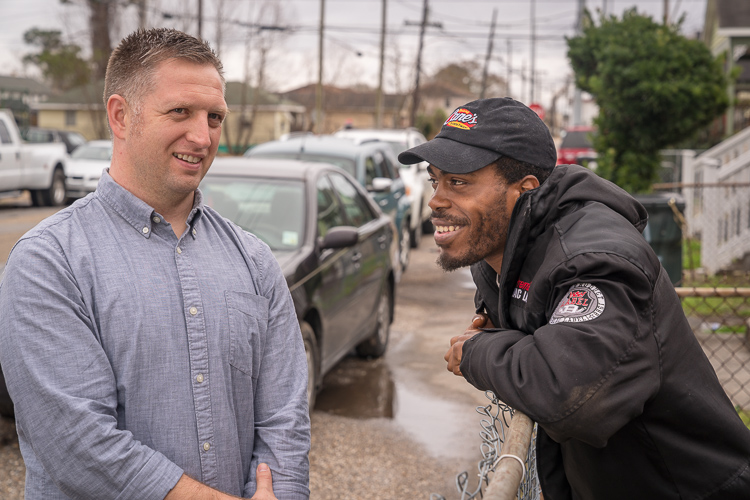
Phillip with Joshua Holland, co-pastor at Level Ground Church
Joshua: So, the journey to New Orleans started for my wife and I back in our home state, Kentucky, in Eastern Kentucky, up in the Appalachia Mountains. I grew up in a little community called Redfox, my wife grew up in a community called Lotts Creek. So, if you ever hear about the hills, the hollers, the hillbillies. I was a pastor at First Baptist Church of Hazard, Kentucky. The hillbilly life, it's real. It's real authentic culture for sure. But we just really had a strong sense that the Lord was calling us for more school, to get my Masters, and so we came to New Orleans to the seminary to study, to work on my Masters of Divinity, in Gentilly, the New Orleans Baptist Theological Seminary. So, came in 2011, really came down with a heart for the urban context, New Orleans, to be in the city. So, when we first moved here and got really involved in the city, I was coaching football one of the local parks. And so, in 2013 my wife and I were approached with an opportunity to start a new church in in the city of New Orleans. And that was kind of a whole journey because when we were asked to do that, we were given that assignment to start church, but where? New Orleans has how many distinct neighborhoods? I forget the number, but there's a number. We have like 70 some distinct neighborhoods in the city, so where to start a church, we didn't know. So, we just really started praying, we started praying that God would pinpoint where he wants us to live. So, he directed us to a house on Cambronne Street, which is just a few blocks that way, and we were able to buy that house, and once we got into the house and bought the house then we found out we found out we are in Hollygrove. We didn't even know. |
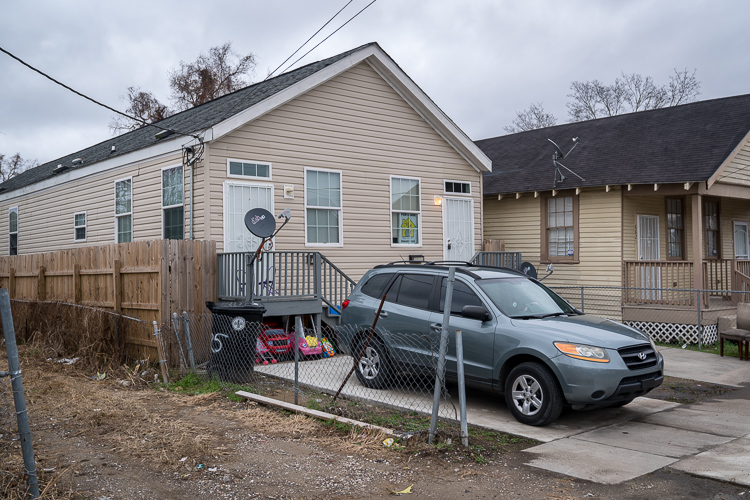
Q: What are some of the major things you find yourself doing in the community? Joshua: First of all, my children go to school in this community. So, I find myself being very active with the local school. A lot of the families and kids go to that same school, so my wife and I have just immersed our children and ourselves into the life of that school. So, I find myself contending for that school. I find myself even contending when there's times that the school where I don't, you know, there may be an issue that comes up, but the school, that I don't feel like is in the best interests for the students or the teachers. Like I find myself, you know, speaking up for that. And so, I definitely find myself contending for our local school, I find myself contending for local neighborhood park, I find myself at our Hollygrove neighborhood associational our meetings. So basically, if there's anything happening in Hollygrove I find myself there. |
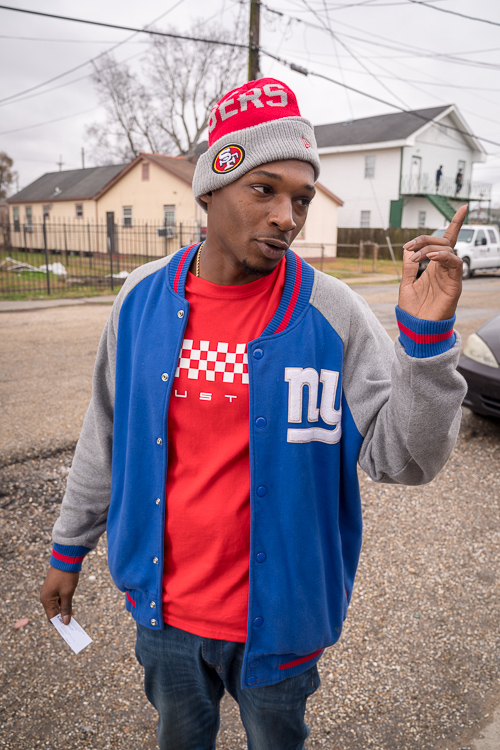
Nathanial
Joshua: What’s up man? How you feeling bro? You doing all right? Nathanial: Alright. Joshua: Good to see you bro. Nathanial: Hey man. I'm called hat junkie, hats, bills, beanies. Y’all contact me on Instagram. What y'all doing? I know Mr. Kevin. I used to go play pool at the Center right here on Clay street. This is like after Katrina and, you know, everything wasn't really up to par, they had the park really looking still like that. Joshua: I’ve been coaching out there, basketball. I have five kids. I live on Cambronne and Apple, I just live on the other side— Nathanial: Right on the other side? Cool. Joshua: My kids go to Lafayette and my one little boy goes to Dunbar. Nathanial: Oh, Alright. My son he ended up going to—right across on Apricot. Joshua: I'm trying to be out here on Thursday nights ballin’. I have some guys from the church that want the ball on Thursday evenings. Nathanial: On Thursday evenings? Now see, sometimes I get off at six—I be driving trucks—sometimes I get off at six, seven depending on the traffic, but I'll catch y'all though. Joshua: We ball at like eight or nine. Nathanial: Eight or nine? Alright. Aye. Call me, aye, if y’all ever need a hat, fedoras, snapbacks. There you go. Boom. |
![]()
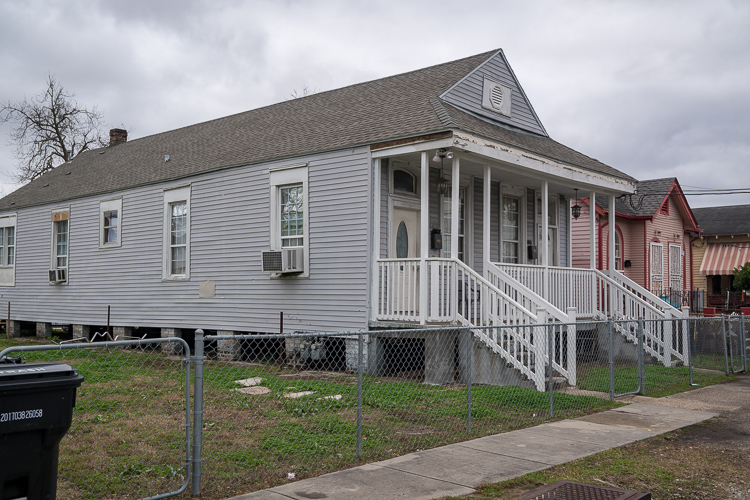
![]()

Ursula with her granddaughter. Ursula's family are community leaders
who
owned a bar in Hollygrove for several generations that catered to a more
settled crowd.
Unfortunately, it burned down and has not been replaced.
Ursula: Yeah. I’ve been here 70 years. Now there’s, obviously, a diverse group of people. More diverse than it was pre-Katrina. There's not enough people coming together the way we used to. At one point we’d have yards joined together because there weren't that many fences, that was always open. We had a barroom next-door. It was all primarily family, you know cousins. It was family. We were just all together. Katrina—we went different ways. Some of us came back and some of us stayed in other states, so. Now, I don't know 90% of the people who live across the street. I really don't. For one thing, the rental thing, it was homeowners before, primarily, so now it's in an out. There are two families that are still in this block, well three families included mine, but that's it. Actually at one point there were five barrooms. Our barroom was in the middle and then each corner in that block between Eagle in Edinburgh, all four of those corners were barrooms. But they had apartments attached. So, it's changed quite a bit. Q: Were they all different? They all have sort of different sort of loyalists? And a different kind of character? Ursula: Yeah, yeah, they did. Actually, my grandfather, who owned our barroom, forbade anybody from going across the street. To at one point it was called Harry's, then Margie's, then it just changed a whole bunch of names. And years later after my older relatives— most of the older people in my family except for my mother and my aunt when they were gone, my daughter decided she was going to visit, and so she was put out. Not after the first time, but after the second time. Okay? Kevin Brown: But that was kind of everybody. As you told the story to me one time, that was kind of everybody's rite of passage—when they could finally go to the barroom. Ursula: And Courtney, that's my baby girl, the barroom burned down. Courtney was just going to be legal and she couldn't stand the fact that the barroom had burned down [laughs]. She couldn’t get in! So. They had a diverse group of people, but it was all neighborhood people, you know. It’s just that they had a little rowdier crowd this way, and a little rowdier crowd that way, that kind of thing. |

Kevin: So, back to the clientele, how would you describe the difference of your clientele at Morris versus Mrs. Margie’s, and then when it became Big Time Tips then it became Snake and Jake’s— Ursula: Oh, it was Ghost Town Snake and—yeah it had a lot of names. They allowed more. You had more freedom. My grandfather had an older group too. He had an older group of people and they were—not that the people of the barrooms didn't work, they had to, to go to the barroom, but they had a steadier of group of people that had grown up with Poppa. You had your loyalists. But I can say when you got dressed up on the holidays everybody had to pass through my grandfather's place. But then you’d have a good time everywhere else too. And they had so many people, like I said, with the apartments, that kind of thing. |
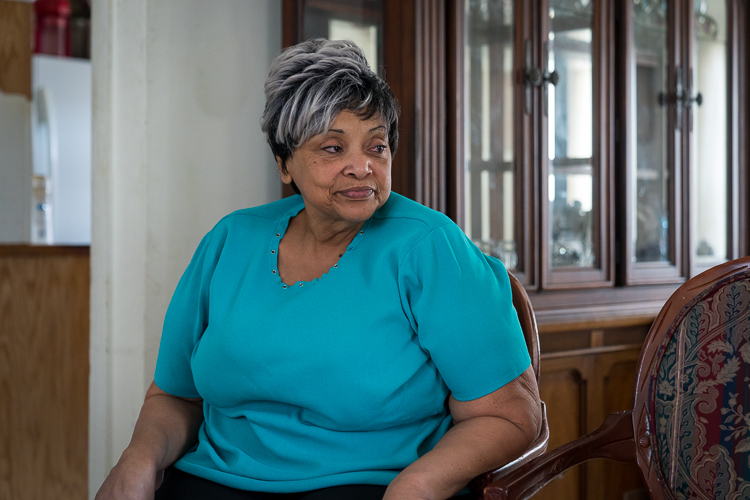
Q: Did you and the others serve food also? Or not? Ursula: Well yes. Actually, our place was, when Super Bowl started coming in our place was the place to be because every Super Bowl we had the big party, and of course the big pool. What we served, every year there was a whole pig roasted. And everything, we had turkey, ham, anything you can think of we had, and all the veggies, all that kind of stuff. Kevin: And y'all did crawfish boils. Ursula: Right, right. My brother would have seafood boils every Wednesday and Friday, yeah. And that brought in everybody because we were the only ones doing that at one point. After the barroom burned down, of course, then [Tips] took over with that. Q: But you didn't build it back? Ursula: No, we were going to. My mama desperately wanted to bring it back. But two of my sisters and an aunt talked my other aunt into not opening the place back up. Mama was in her 70s, so. They didn't get it back open. And she grieved. Kevin: But you did continue the crawfish boils, for a long time. Ursula: Yeah, we did do that. A lovely thing that occurred after the barroom burned down was, since everything was really open then—we shared the two yards—everybody would come in every evening after work. They had to be together, basically that's what was going on. Everybody needed to be together. |
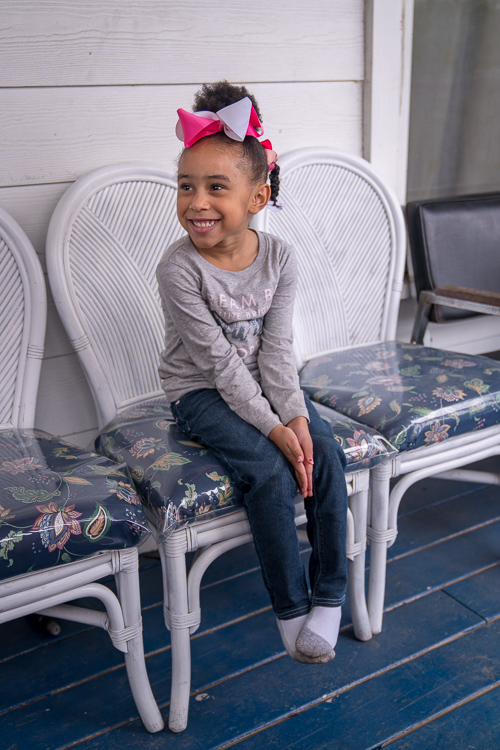
Q: You started to say that there are different people moving in more recently. Can you talk about that a little bit? Ursula: The whole thing is with rental property is sometimes you get a tenant that's going to stay. And a lot tenants would stay if, when you have a double and you have a good tenant, and if you don't honor that good tenant by putting another good tenant on the other side, then you are going to lose your good tenant. And eventually other tenant is going to move on because their lack of paying or whatever. A landlord has to be responsible for his own self-safety of his property, if he has a good sense, but if he doesn't then you just lose and lose and you have a constant turnover. And it's bad for the neighborhood. Q: Do most the landlord's live near here? Ursula: No, no, no, no, no. [Laughs] Q: So, you feel like they may be a little bit less engaged? Ursula: Definitely. Yeah. We have quite a few young, mixed couples in here. Some for the good and some for the bad. But it would be nice if the neighborhood were even more diverse and with more ownership. The people who like rebuilding our neighborhoods have helped get homeowners a lot of help. At one point they helped finish our house. They were a tremendous help to us and to other people in the neighborhood as well. You know what’s so dumb? The state is willing to subsidize Section 8. Why not help someone who would like to own a home? Pride of ownership makes a much better neighborhood. You know? It is so foolish to keep shelling out money and paying more than a person would have to pay for their mortgage. It doesn't make any sense. And then you’d have somebody with something instead of just giving it to somebody who already has something. It's dumb. That you can print. [Laughs] |
![]()
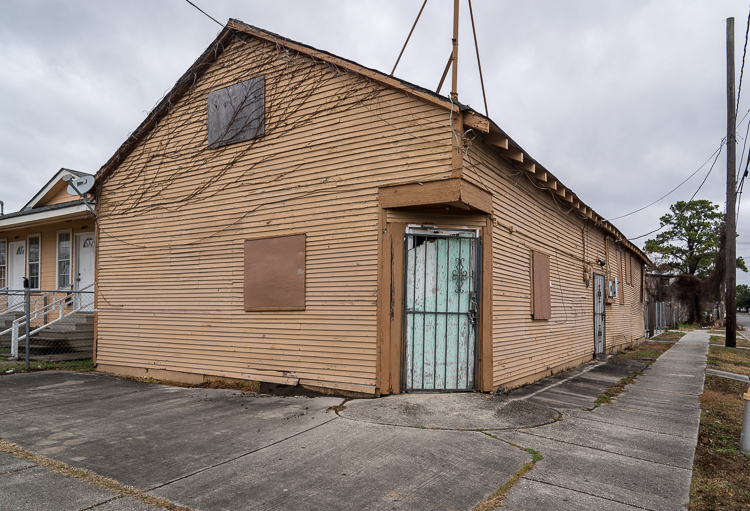
The former "Big Time Tips," a barroom that community leaders got shut down.
It was the site of multiple shootings and homicides.
Kevin Brown: [After Hurricane Katrina] through a process of citizen engagement, residents worked with a city planner to re-imagine their community and develop a set of priorities to be implemented both by residents and by the city. This proved to be a critical turning point in two ways. First, it inculcated a sense of empowerment. Second, it attracted the attention of AARP, an organization dedicated to seniors. One of the resident priorities was crime reduction, and a committee was convened to address the issue. Two crime experts were engaged to train committee members in crime reduction strategies. The first helped community members identify crime hotspots, places where violence was highest according to police statistics. The second trained residents and representatives of the police department to understand how to prevent and respond to crime at these microlocations. Also significant was AARP’s ability to engage the city councilmember in the process, who prioritized the community’s crime reduction goal and pledged to work cooperatively with residents and the police. An early victory was the closure of Big Time Tips, an alcoholic beverage outlet that was the location of most violence in the community. Residents worked together to notify the police department of every incidence of crime at the bar. Ultimately several law enforcement agencies raided the location and found sufficient cause to temporarily close the establishment. Residents then attended the hearings of the Alcohol Tobacco Commission in New Orleans to testify against the owners, assuring the bar would not be able to re-open. |
![]()
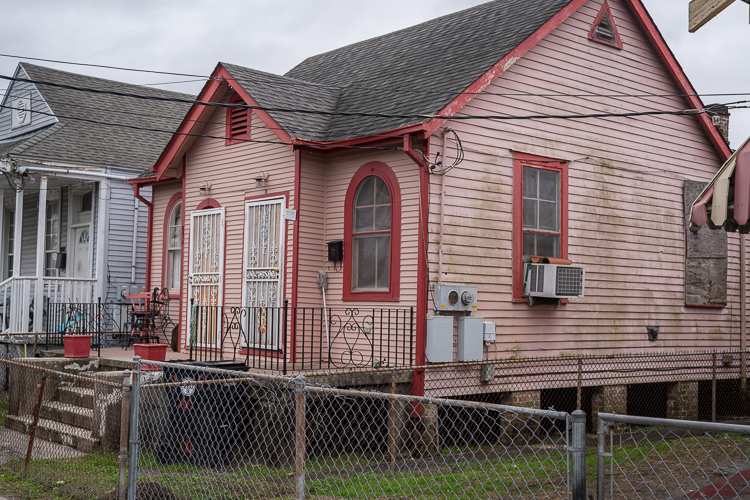
![]()
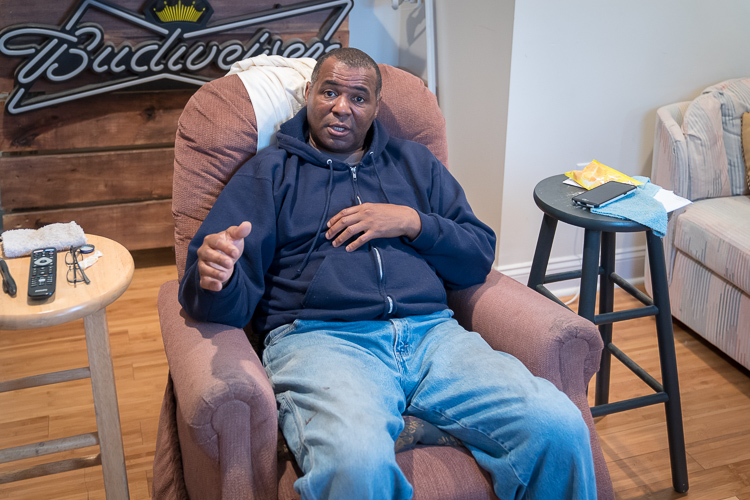
Hank
Hank: So what happened is, the hurricane, like I said it was bad, but it washed out all that evil, man. Across the street there was a grocery store, and nothing but drugs, and even I was involved in it. They’re out there hanging out doing their deal. And you guys seen the corner up there—that was another drug spot. For some reason the stores, just be drug spots. All the drug dealers hang out there and all the people that want drugs go there. So all that got washed out, plus Kevin and his associates, they made an ordinance or law, but Kevin came up with this deal that they closed down the bar. There was a bar down here, and they used to kill back here a lot, man. I wouldn't say a killing field, but at least one person a week got killed back there. At least once. At least once. Sometimes three or four shootouts. It sounded like Beirut here. I’d be in the house, this is before the hurricane, you hear, ‘BOOM! BOOM! BOOM! BOOM!’ all the time, but after the hurricane, kinda washed that out. So after the hurricane, Kevin and them stopped that place from opening. It opened for a little while, but they finally shut the place down. |
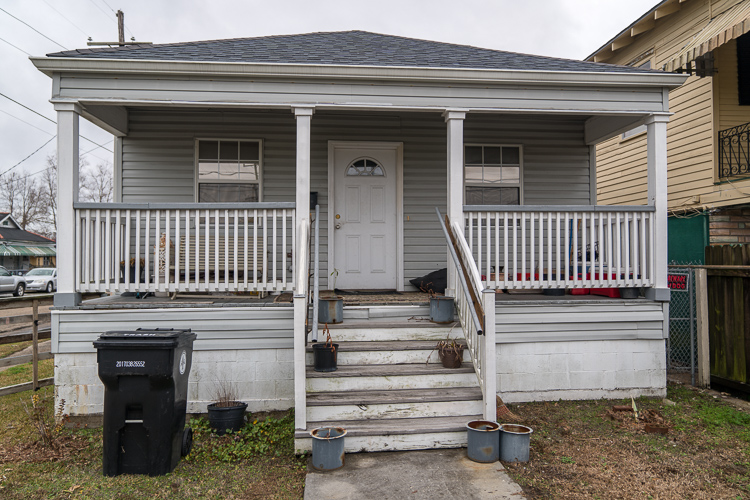
Hank: So now, the update: it's nice back here now. This is a family house, this house has been here for—I’ll be 64, so this house has been here for almost 80 years. It's the family house. My family. This place was the first barbershop in the neighborhood, my grandfather was a barber. And it was the first nursery [school] in the neighborhood. My grandmother used to work for the Mayor, Chep Morrison, and my grandfather did the barbershop. So, we got some roots back here. So, everything is—look how quiet, look— So, now it's kind of quiet. It's a lot better. It could improve, but it's not like it used to be. So, the house property values are going up, the places look kind of nice, they need a few little streets [paved], but this is nothing like it was. Nothing at all. That's all I can tell you, that the place has improved greatly. Kevin and his associates, they got the playground that they have up here. Not this block, two blocks away is Hamilton Street and there's a playground down there. And Kevin put those jungle gyms and all that up, fixed the basketball courts, lights. He made all that come to pass. This used to be wild back here, man. I'm just being serious. Used to be wild back here. When did it become wild? I guess when that crack came out. That was like ‘85, or ‘87. So, the bar was open, the store across the street was open, the next bar was open on the next block, and then they had about two or three bars and grocery stores on both blocks. On that block and on this block—in fact, three blocks! Forshey, Olive Street, and down here. So, three blocks drugs and liquor. It was wild. It was bad, but it escalated to a new level. In the ‘90s, around when I first met Kevin, oh, it was wild. And they kept getting worse and worse. They stayed in the news, back here somebody getting killed. I mean, right outside, right out here [pointing at front porch]. Because of the bars and because of the grocery stores with the alcohol. That fuels that type of an environment. And the older people, they just wanted to stay in their house. They don't want to get shot. If they say something to someone then they're going to have a problem, so. |
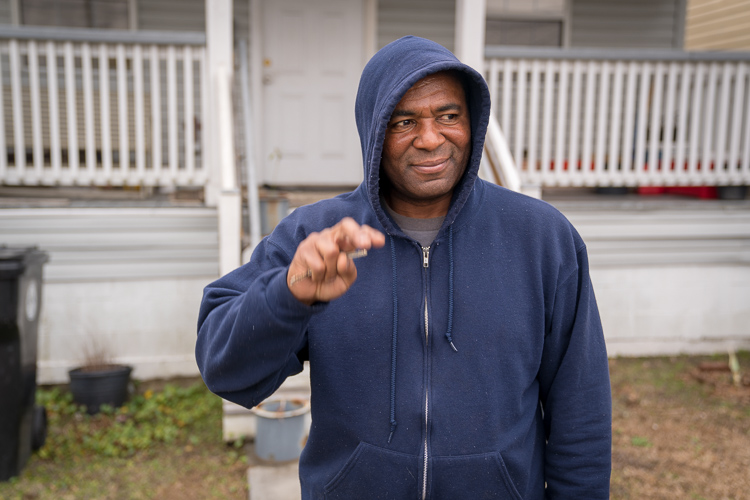
Kevin Brown: He could tell you it some stories about some bad stuff back here. He's told me some stories and I can't even believe people live like that. Hank: It just was nothing nice, that's the term. It was not nothing nice back here. Only the strong survived. If you was weak you got ran over. I can give you a story, and this is true, Kevin knows this is true. My daughter, my ex-wife was Chinese, but we got a daughter. She's half black, half Chinese. Pretty girl. She came down here when she was 14 years old, came down here to visit me and she was going to school. And one day this guy came and got her, came up to the house said they're going to the movies. They went out to the movies and my daughter didn't come back. So, I’m like, “I wonder where she is.” I noticed it was getting kind of late. So now, it’s the next day and I’m like, “where the hell is she at?” I couldn't find her, I didn't know what had happened to her. This dude called the house and told me that he got her and he ain't letting her go. So, I'm like okay—if my daughter really didn't want to be with him she’d find a way to get away, because I know my daughter. So, she didn't come back, so I'm like, ‘when she gets that out of her system she’ll come back.’ There's no need if I'm going to get her and she still wants to be there, when I bring her here she's just going to go right back. So, I'm like, ‘well let her get enough of that, when she gets enough of that she'll call me and say, “daddy come and get me.”’ So, these people, unbeknownst to me, these people was like in another neighborhood over this way [pointing]. They had that whole neighborhood drug controlled. They had it all controlled. And a guy that was over there, was guy by the name of Walter Ward. My brother’s friend knows what my daughter looks like, so he knew where my daughter was, where they were keeping her. So, my daughter got tired. She got on a pay phone and she called me, said, “Dad, I'm ready to come home.” Said, “but this dude won't let me go. He don't want to let me go.” Remember now, she was 14 years old. So, I'm like, “Well, where are you at?” So, she don't know that I know my brother’s friend knows where she is. And he showed me where she is, but I didn't go and get her, like I said, because if I go get her and she didn’t come on her own, and she’ll go right back. I experienced that. So, let her get tired of it, then I’ll come get her, then she won't run back to him. So, the guy gets on the phone and tells me, “you want your daughter?” I said, “yeah.” He said, “well, come and get her!” ‘CLICK’ and hung up. Oh, you told the wrong person that. “Come and get her.” I’m like, ‘you ain’t saying nothing—that’s my kid!’ What you going to do? Forget me. I'm going to get my daughter. So, I got this long barreled .357, pistol, loaded up and I waited until nighttime came. I snuck over there and I went and got my daughter—had a big shootout, brought her back. Then those guys came over here, shot the house up, had another shootout with them. I had two or three shootouts with them. So, this guy, Walter Ward, he run those dudes. So, one day Walter Ward pass and I was sitting outside with my daughter. So, I'm like, “there goes Walter Ward.” And my daughter tells me, “there goes Walter Ward.” And he stopped at the corner. So, I got the pistol, so he looked, he didn't say nothing. He looked at me and I stood up with the pistol, so he took off. About 10 minutes later he comes back and he parks right over there [points out front of his house]. Him and his other get out with two AK-47s. So, I'm like, ‘something is wrong.’ For some reason I had that in my head. ‘I should go talk to them,’ but I'm thinking maybe it's too late to talk to them because now he’s back with two AKs, him and his other guy. So, I put the gun down, let him see that I put the gun down, and I walked over to him. And he said, “look, don't walk up on me! I know, I heard about you with that martial arts.” Then he said, “Why did you rob my dope house?” I'm like, “I didn't rob your dope house. What are you talking about?” He said, “yeah! The guys that shot up your house and all that, they said you robbed my drug house!” Now, he knows my daughter because my daughter was with his nephew, so he has seen her. So, I said, “don't you know that girl?” He said “yeah,” he said, “well, why would you rob my dope house?” Then—this is what I'm telling you—then he said, “what you doing over there on the porch?” I says, “that's my grandma.” He says, “grandmother?” I said, “yeah.” He said, “your grandmother is Ms. Mary?” I said, “yeah.” He said he was a baby coming over here to the nursery. Can you believe that Kevin? That's amazing. That guy didn't start shooting because he knows this was the nursery. Because he knew this was the nursery. Q: Did he know it was your daughter? Hank: He knew that was my daughter because he saw my daughter with this kid that was his nephew, so he seen my daughter around in this place. Q: He didn't understand you were getting your daughter? He thought you're trying to rob it? Hank: These people told him that I came over and robbed them. They didn't say nothing about my daughter. Said I came over there and robbed them. He said, “well, if they came and robbed you, you need to uphold my reputation. You got to go over there and do them something.” But he knows my daughter because he told me to my face. He said, “man, I've been telling them, ‘who is that girl? Send that girl back. You're going to bring trouble here, she's just a youngster.” I said, “that's what happened.” He says, “man, I got a daughter. I got two daughters. I don't blame you. I would've done the same thing.” He said, “I'm going to go back there,” because now, all this drugs and money that’s missing, these people saying that I did it. See what I mean? So now he's like, “I'm Walter Ward; nobody robs me! Nobody robs me!” He's big-time. He got killed, he’s dead now, but he's a big-time drug dealer. He was vicious. He would go into people’s houses and wait till they come home and shoot them, or he’d shoot your mother, or anything if you owed him money and wouldn’t pay him. He would retaliate in some kind of fashion. But, like I was saying, I don't mean to be repetitious, he didn't start shooting—usually he just gets out and starts shooting, he don't just wait, he gets out and starts shooting—he didn't start shooting because he saw me sitting on the porch over here and he used to come here as a kid to the nursery. Isn't that something? It's amazing. So, he told those guys don't never come back here. He told me, “if you ever see them anywhere around here let me know.” And those guys never came back at all. Never. A few times he passed by and sit down, talk to me, wave at him, shake his hand—we'd laugh about it. But they had actually put me in a bad spot. |
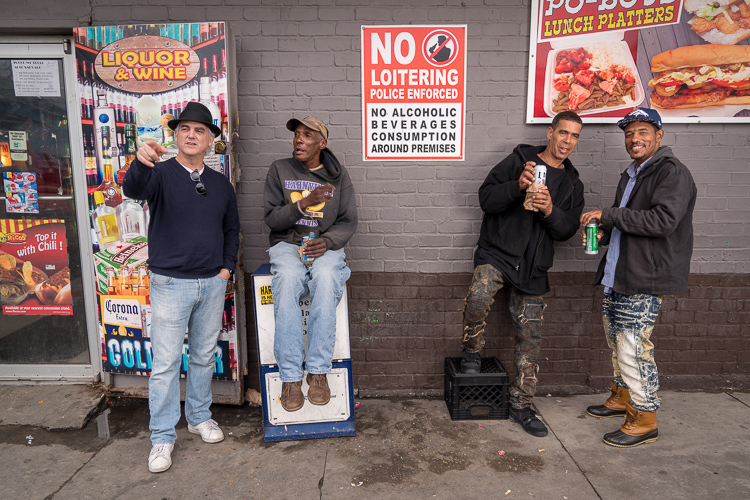
Kevin Brown (left) and other community leaders and residents would like to shut down
this convenience store, which has been the site of numerous shootings and homicides.
The other men in the picture are friends of Kevin's.
Q: But you know, it seems to me you're telling me something else too, which is that all of this trouble at the little grocery stores, and bars, and all that, that’s not spontaneous. It's very organized. Somebody said, “that’s the spot we’re going to use.” Hank: Yeah. Well, some higher up got some younger kids and they all run around like ants, but they got a queen. Q: They don't just happen to gather there? Somebody is saying, “alright, that is the place.” Hank: Right. That's where they gather because it's a grocery store. And people are going to come to the grocery store. So, if you're just standing there and it seems like you’re milling around, drinking a few beers, but actually that's a ‘drug store.’ You're really going up to the grocery store to buy drugs. So, if you close down the grocery store, then they don't have nowhere to come to. That's why we’re so glad that Kevin got that place down here closed, this bar down here, because it was notorious. They called it Big Time Tips. I don't know if you've ever heard of that. They called it Big Time Tips. And they used to have murders back here, man. It was ‘Murder Incorporated’ back here. I'm not jiving you at all. Back then there used to be like a war back here, but now it's nice and peaceful. It’s a great improvement. Vast improvement. Tremendous improvement. But what I told you that is a very true story. And to add to it, my dad told me, “why don't you go to the Police Department? Tell them the guy has got your kid, they kidnapped your kid. Don't bring trouble here to the house. Your grandma is here,” my oldest brother's little daughter was here, he said, “don't bring trouble here to the house. Go call the police. That's what they're for.” So, I did that. They didn't do nothing. They didn’t do nothing at all. They came up with all kinds of excuses. ATF came over here, detectives, everybody came over here. They all came over. They didn't do nothing at all. So finally, you know, when my daughter called me and said come and get her and then this guy got on the phone and said, “come get her if you want her,” so that was like maybe two months after I had talked with the police. And they didn't do nothing; “well, your daughter is a possible runaway.” They just, they didn't care. So, when the call finally came, I went over there and got her myself. And I just knew I was going to get killed that night, but I'm like, “I'm going to get my daughter.” I'm going to get my daughter. The guys followed me and I had a shootout all the way from where they stayed—from over there, near Lowe’s, all the way back here. I had a shootout with them, all the way back to the house. But I didn't get hit. My daughter didn't get hit. Under the grace of God. That made me—if I never believed that God hears prayers and helps you, I believe that. There's no way I should've gotten out of that. I should've done gotten killed that day. |
![]()
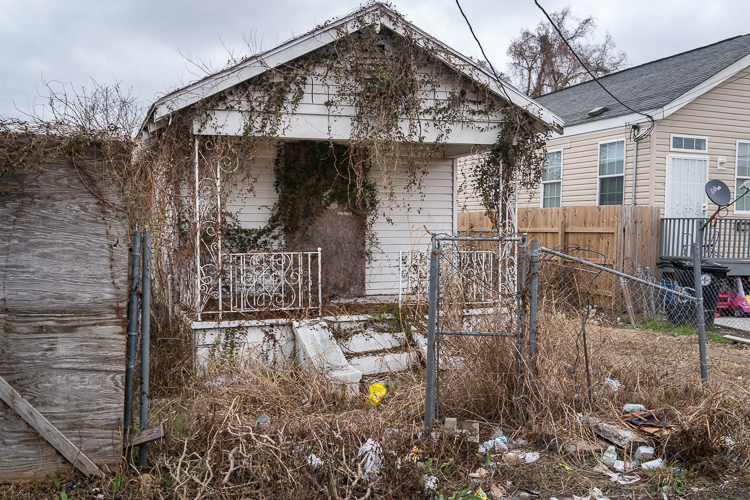
![]()

Li'l Wayne's old house, Kevin thinks...